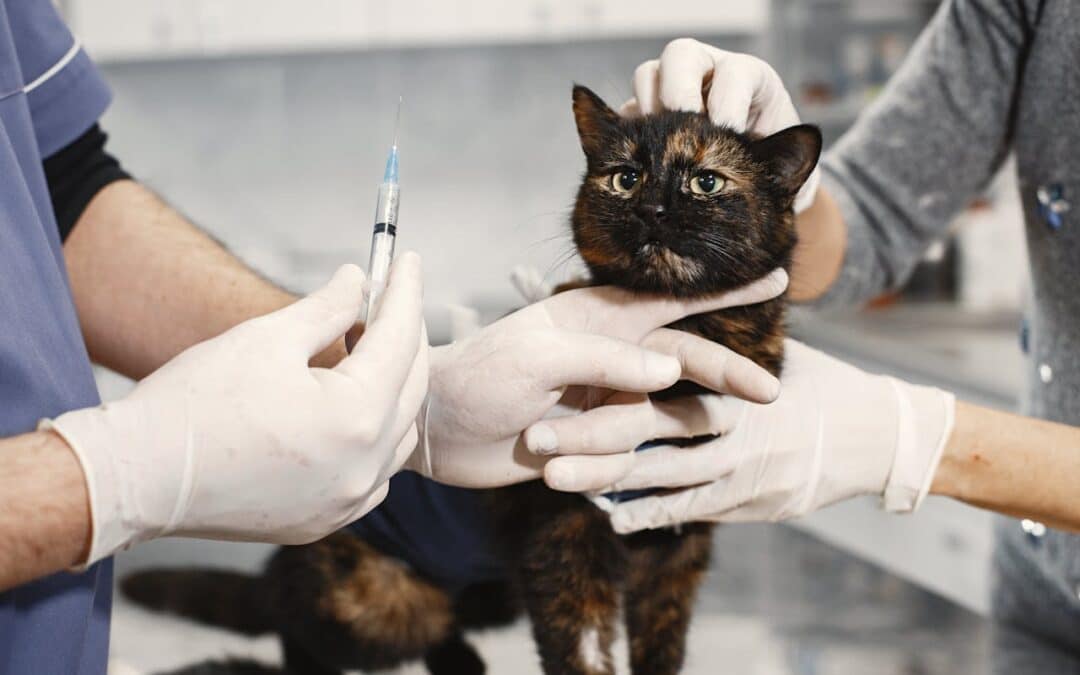We all want our pets to live long, healthy lives, but they can’t do it without a little help. One of the most reliable ways to give them extra protection is by keeping up with their vaccinations. They keep your pet safe from dangerous diseases like parvo, distemper, and rabies that can spread quickly and, in many cases, can be life-threatening.
The tricky part is that pets don’t need the same vaccinations at every stage of their life. Although it’s up to you to decide to get your pet vaccinated, only a vet will be able to tell you which shots your pet needs and when. Here’s a sample pet vaccine schedule to give you an idea of what to expect.
Pet Vaccine Schedules by Age
Puppies and Kittens
The first year of your pet’s life is a busy and important one. Puppies and kittens usually start their vaccine series around 6-8 weeks old, and they need boosters every 3-4 weeks until they’re about four months old. Keeping up with the schedule is especially important at this stage—if you wait too long between doses, you might have to start the series over from the beginning. This early vaccine series helps build a strong immune system and ensures they’re fully protected as they grow.
- Core vaccines for puppies include parvo, distemper, adenovirus, Leptospirosis, and rabies.
- Core vaccines for kittens include the FVRCP group and rabies.
Depending on your pet’s lifestyle, your vet may recommend additional vaccinations. For example, they might recommend bordetella shots for dogs who go to daycare or groomers, or feline leukemia (FeLV) vaccinations for cats that spend time outdoors.
Adult Pets
Once the initial series is finished, most pets only need boosters once a year or every three years, depending on the vaccine. Your vet will make sure that the schedule fits your pet’s lifestyle. For example, an active dog that hikes may need more protection than a couch-loving pup. And outdoor cats usually need more coverage than strictly indoor cats.
Senior Pets
Older pets still need vaccines, but your vet may adjust their schedule as they age. Seniors often have weaker immune systems, so some vaccines may be given every three years instead of every year due to age-related health risks.
Why Staying on Schedule Matters
Just like with people, the protection from vaccines fades over time. That’s why boosters are so important. Skipping or delaying them can leave your pet at risk for illnesses that are expensive—and sometimes impossible—to treat.
For example:
- Parvo can be deadly for unvaccinated dogs.
- Rabies is fatal once symptoms appear, and it can spread to humans. That’s why vaccination is required by law.
- Feline respiratory viruses can spread quickly in multi-cat homes.
Protect Your Pet at Every Age
Your pet’s vaccine schedule is more than a checklist; it’s their best chance at a long, healthy life. From the time they’re puppies or kittens to well into their golden years, vaccines help give pets the protection they need. But you don’t have to keep track of their schedule all on your own.
At Anasazi Animal Clinic, we’ll walk you through exactly what your pet needs, so you never feel overwhelmed. To make things easy for you, we send appointment reminders and can provide your pet’s vaccination history whenever you need it. So if it’s been a while since your pet’s last checkup, give us a call—we’ll help keep their vaccines (and their health) on the right track.
Photo by Gustavo Fring on Pexels used with permission under the creative commons license for commercial use 10/15/2025

